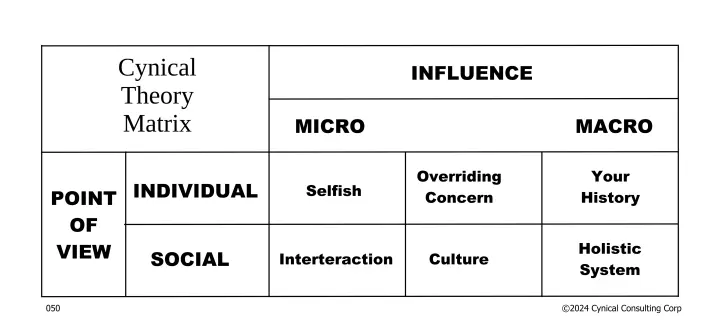Cynical Theory Overview
Cynical Theory identifies the underlying motivation of people with six axioms based on Science, Logic, and Common Sense.
Background
I remember encountering people all my life!!!

They are everywhere; you can't entirely escape them (you are a person, too – and you're always around).
People are the primary source of all the joy and sorrow we experience daily.
People can cause mild irritation, frustration, or exasperation; or they can cause significant intellectual, emotional, or spiritual damage.
People can be kind, caring, supportive, comforting, nurturing, and benevolent.
Why is there such a variance in our interactions with people?
Because we are all unique!
This uniqueness creates the differences in how we think and act. The differences make people unpredictable; yet, they can be surprisingly predictable.
From my experience in the working world, this sentiment summarized my experience:
Everything is easy if it weren't for people.
- Gary Bozek (1985)
As a nerd, I analyzed, categorized, and organized my experiences; I sought guidance from management, psychology, philosophy, and anthropology theory. These theories provided a perspective and detailed insight into a specific topic, but there wasn't a simple, overarching theory that could unify everything.
I was frustrated.
So, I applied Science, Logic, and Common Sense to theorize why people did what they did.
My ideas coalesced into the six axioms that comprise Cynical Theory.
Cynical Theory is not a prescriptive tool! It can't predict exactly what someone will do at any given moment. Nor can it identify why someone behaved in a certain way.
People are far too complex; many internal and external factors interact with and influence a person's behavior.
Cynical Theory is an analytic framework to analyze and understand an individual's motivation and behavior. Each axiom identifies an area of analysis which provides insight into a person's motivation and behavior.
The framework guides the type of data to assemble if you want to really understand a particular person, their motivation, and behavior.
Cynical Theory guides data gathering to help you understand YOURSELF or OTHERS better.
Overview
Cynical Theory is a set of six axioms that identify the fundamental motivations of people; it provides a basis to understand human behavior and interact with other people.
How can such a complex topic as human behavior be condensed into six simple axioms?
I was guided by my philosophy:
If you cannot explain a concept - no matter how complicated - in three sentences or less, then you don't understand it.
- Gary Bozek (2002)
I applied my analytical skills to simplify the complexity of human behavior into simple rules to apply to everyone. I looked for the patterns and classifications that expose the commonalities across all behavior.
Following the scientific methodology approach, I theorized, tested, refined, and repeated. First, the six axioms became evident. Later, I realized that the six axioms fell into a two-dimensional matrix.
One dimension is POINT OF VIEW. Point of View refers to whether the focus is on an individual or a social group.
- Individual - the point of view is internal and focuses on the factors that influence a specific person.
- Social - the point of view is external and focuses on the factors that come into play when one or more people are involved.
The second dimension is INFLUENCE. Influence categorizes the size of the force acting on a person.
- Micro - the influence is from a single or small factor. One, or few, factors contribute to the final effect.
- Macro - the influence is from a large group of factors. A macro influence has many factors that all contribute to the final effect.
The following table summarizes the six Cynical Theory axioms.

Cynical Theory Axioms
1. Selfish
People Are Selfish.
Selfishness is the Primary motivator of human behavior: everyone is out for themselves.

We have free choice; so why wouldn't you make choices to benefit yourself? Choosing your self-interest is the fundamental concept of Cynical Theory. (That is why I chose the word "cynical" – that's what it means.)
To be clear, the first axiom, Selfishness, refers to the motivation behind a CHOICE someone makes.
Don't confuse this axiom with behavior. You may behave selfishly or unselfishly, but the CHOICE is always made by you (which inherently makes it a SELFISH CHOICE).
For example, I suggest that Mother Theresa was selfish! You may take exception to that statement. She certainly acted very altruistically and unselfishly – I agree with that. But her CHOICE was entirely SELFISH: Mother Theresa made an active CHOICE to act congruently with her faith and beliefs.
Yes, her behavior was not selfish, but her motivation to act unselfishly is due to the purely selfish pursuit of her faith and beliefs.
The primary factor contributing to personal motivation is selfishness.
2. Overriding Concern
An Overriding Concern Modifies Behavior.
If we hold that Axiom 1, People Are Selfish, is true, then we have two incongruencies in observable behavior.
First, people may not act selfishly. Second, people may act in a way that is harmful to themselves.
Unselfish Behavior
As discussed above, we are capable of choosing to behave unselfishly.

Let's analyze a soldier. They want to live but are trained to run headlong into danger, knowing that they may lose their life.
It is also true of many careers, like policing or firefighting, where they willingly enter dangerous situations. If you are a parent, you know you will risk your life to save your child.
We can conclude that there is something that overrides one's selfish desire for self-preservation.
An overriding concern is often based on principles. Soldiers, police, and firefighters place themselves in harm's way based on the principles of service, brotherhood, liberty, altruism, or honor.
Unselfish behavior is always due to some overriding concern that displaces the inherent selfish motivation.
Harmful Behavior
People do dumb things!
People do things that harm themselves!
People do things that harm others!

Why do people smoke? Science exposes that smoking has long-term harmful effects, but people still choose to smoke.
People also succumb to addictions and other bad habits.
Again, an overriding concern drives a person to make a harmful choice. They may be fully aware of the personal consequences of their choice, but they make it anyway!
The overriding concern is influenced by various factors, such as habits, beliefs, wants, needs, laziness, or persuasion. This isn't an exhaustive list; the diversity of people and situations is too large.
The choice of harmful behavior is always due to some overriding concern that drives a detrimental decision.
3. Your History
You Are Your History.
Everything that has happened to you in the past has made you who you are today.
That is why we are all unique. Our experiences are unique.

If you stop to think about it, the person you are today is not the same person you were a decade ago.
We all experience "trauma" in our lives (trauma is "an emotional upset"). Trauma may be good or bad and positively or negatively affect us.
Our motivation and behavior are influenced by the myriad of experiences we've had, whether good, neutral, or bad. It is the significant events that occur that cause trauma and leave a lasting effect on our personalities.
Often, we are not even aware of the effects an event has had on us. These emotional upsets can be forgotten, repressed, or unnoticed. We may not be conscious of how a past trauma influences our current decisions and behavior.
For example, you may grow up in a loving or abusive environment. Your personality reflects the environment you grew up in.
But there can be exceptions. Someone who experienced an abusive environment may apply Axiom 2, and consciously decide that they do not want to replicate the abusive behavior. People make a choice (consciously or subconsciously) about how to react to the trauma they experience.
A person's primary personality traits are influenced by experiences and traumas that they have been exposed to.
4. Interaction
Your Personality Is Visible Through Interaction.
Personality is the "complex of characteristics that distinguishes an individual."
Your personality is only visible when you do or say something (when you exercise your power to choose).

Your personality becomes visible to other people when you interact with them. You will act differently depending on who you are interacting with. That is to say: you are a different person with different people.
You are a different person (act differently) to your spouse, children, family, work peers, or strangers.
Each person or situation you encounter brings out different aspects of your personality.
5. Culture
Culture Imposes Standards.
Culture is "the customary beliefs, social forms, and material traits of a racial, religious, or social group."
An individual is influenced by group standards. When many people exhibit similar behaviors, it is called "culture."

Examples of cultural influences are language, beliefs, ethnicity, education, traditions, customs, art, music, literature, or symbols.
Participation in a specific culture means acceptance of the associated group norms and values. Everyone then exhibits similar behavior.
Every workplace has it's own unique culture (positive, neutral, or negative). The corporate culture can have significant effects on mental health, performance, and satisfaction. Ultimately, the performance of the company is influenced by the quality of its culture.
A person's cultural influences affect how they think and behave.
6. Holistic
You Are Part Of A System.
You are an independent individual, however you are dependent on other people and the world around you.
You cannot live in isolation.

You, whether you like it or not, have interdependencies in the world around you.
You depend on others; others depend on you.
You give to others; others give to you.
You take from others; others take from you.
There is an entire ecological system of forces that you interact with all the time. These forces impact your behavior, and, like The Butterfly Effect, your actions impact others.
A person is subjected to the ecological forces around them and, in turn, imposes effects on the system through their behavior.
Summary
Cynical Theory is a set of six axioms that identify the fundamental motivations of people. Cynical Theory is a framework that provides simple rules to analyze and comprehend complex behavior. Understanding motivation and behavior increases your understanding of why people do what they do.
Cynical Theory guides data gathering to help you understand YOURSELF or OTHERS better.
